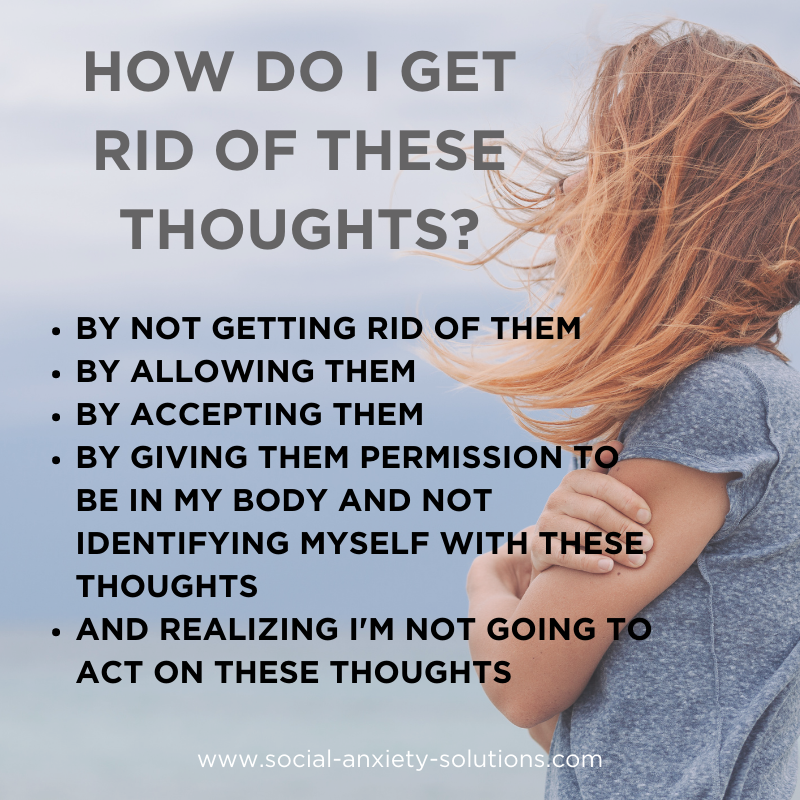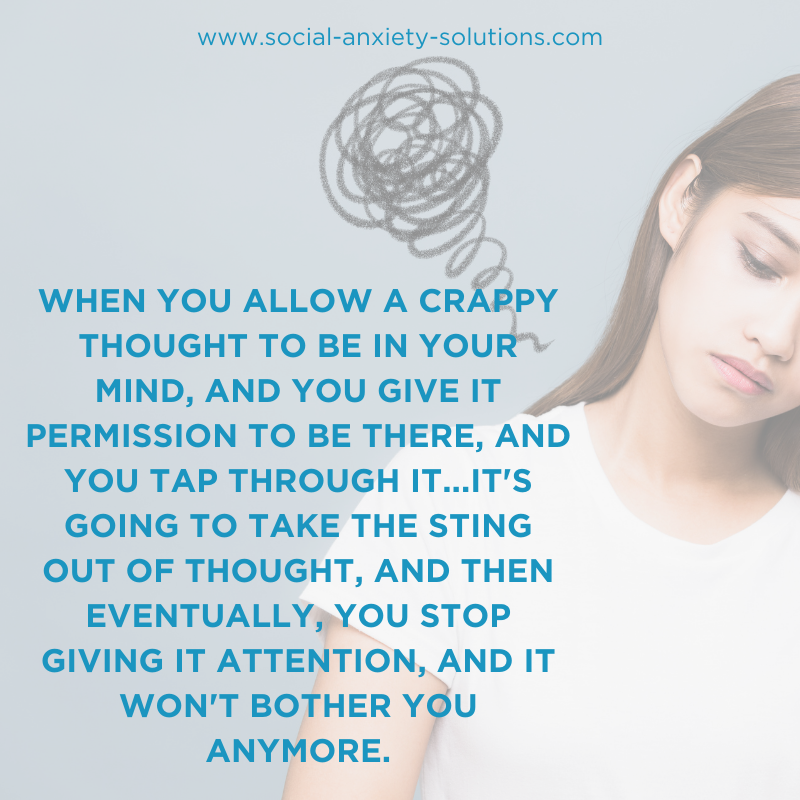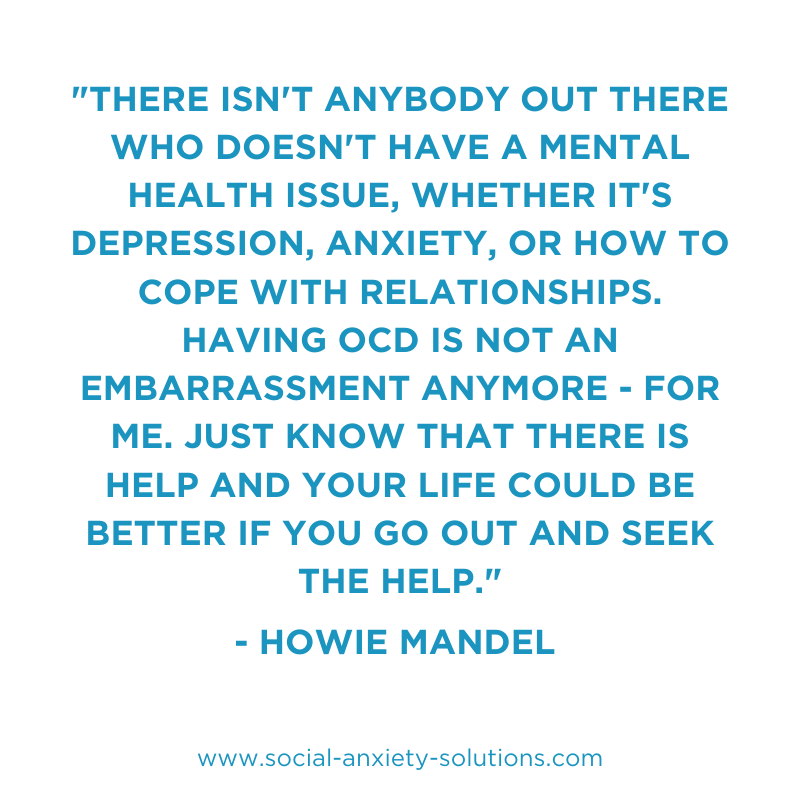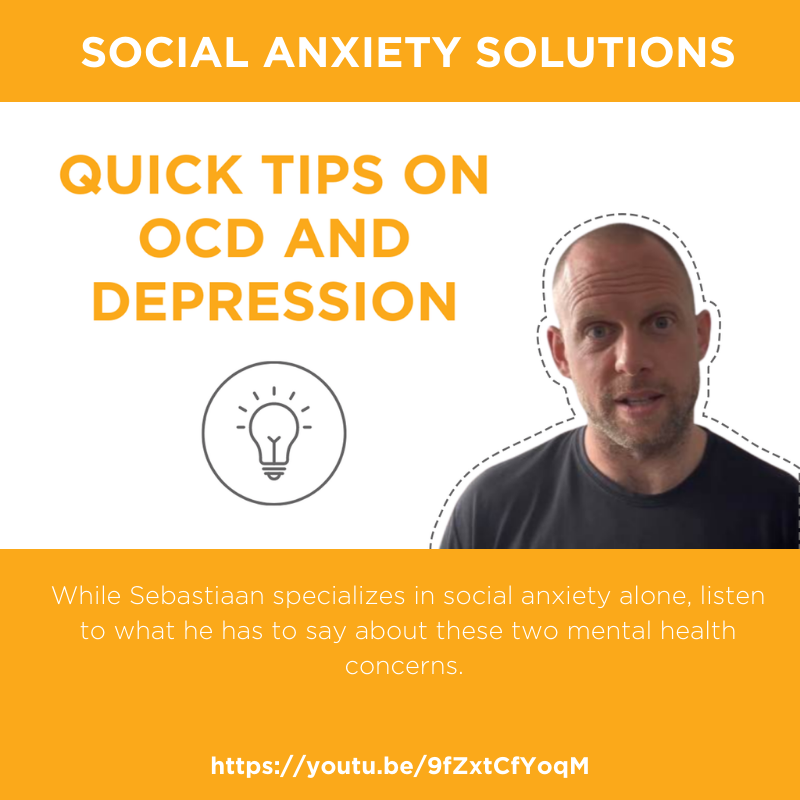SUMMARY
In today’s video, we are addressing a request sent to us via Twitter.
Here it goes:
“Can you please make a video about OCD and depression? Social anxiety roots [from] other mental disorders.”
While Sebastiaan specializes in social anxiety alone, listen to what he has to say about these two mental health concerns.
He also shares some tips, based on personal experience, that you might find helpful if you are dealing with any of these.
Get a deeper perspective on OCD, depression, and social anxiety by listening to these podcast interviews Sebastiaan had with experts who specialize in these fields.
⭐ Depression and SA… When medication is your best option with David Lake 👉👉 https://bit.ly/conqueringdepressionandsocialanxiety
⭐ Depression expert reveals a multi-pronged approach to recovery with Sophia Cayer 👉👉https://bit.ly/recoveringfromdepression
FULL TRANSCRIPTION
What about OCD and depression?
Hey, this is Seb from social-anxiety-solutions.com
I’m a former Social Anxiety Disorder sufferer and a Social Confidence coach. And I got a question that goes something along the lines of… not something of. Goes exactly like:
“Can you please make a video about OCD (Obsessive – Compulsive Disorder) and Depression? Social anxiety roots [from] other mental disorders.”
Yes, this, this is the video. Okay?
And you’re not going to like it too much because I want to be very clear.
I’m a personal coach. That’s first.
I’m not a therapist, I’m a personal coach.
I’ve had a lot of therapy, I’ve studied a lot of therapy, I’ve read a lot of books. And I’ve got a lot of experience as a coach. With over 5000 coaching hours solely working with people with social anxiety. But I’m not a therapist.
And when you have OCD, or when you have depression, you need to work with a therapist, for sure.
That’s the first thing I’m going to say. That’s what I’m going to open with.
It’s probably something that people with OCD and Depression already don’t like hearing, because there’s this whole stupid stigma on therapy.
But when you get a great therapist, Oh man, that’s life-transforming. That’s supportive. That’s someone on your team, someone in your corner, someone who can help you move through the crap. Very, very recommended.
You got to find a good one.
There’s some video on my channel where I talk about how to find a good one, there’s a video on my channel [about] the benefits of working with a great therapist. There’s a podcast about it, lots of information there already, so I won’t elaborate there.
So let’s talk a little bit about OCD and depression.
So yes, there are secondary disorders to social anxiety. But I only specialize in social anxiety. I don’t specialize in OCD, I don’t specialize in depression. So I cannot really share how to overcome that. It’s a whole problem in and of itself.
And right now, if someone were to come to me for coaching, and we do an intro chat, and it turns out, they have medium to severe depression or obsessive-compulsive disorder, I will simply say, “I’m really sorry that you’re dealing with that. And unfortunately, that’s not something I specialize in, and therefore, it’s not something I can help you with.” So I recommend reaching out to someone who does specialize in that because then you can get the right help for it.
And yes, social anxiety might also be a big compounding problem that you have. But you need to deal with these other ones first before I can help you. Alright?
And that is because it’s like these other problems are likely to be the bigger ones. And if you just work on the social anxiety, the other stuff might reduce a little bit, but the others need to be addressed properly.
So that’s a lot of pre-frames and things like me spilling some truth, that might be difficult to hear. But I want to be very honest and upfront.
These are serious issues. And there are solutions for them. But I’m just not the guy, right? I’m the social anxiety specialist and the social confidence coach. So that’s not my specialty.
That being said, I can say a couple of things about it that might be helpful to you.
Starting with OCD (Obsessive-compulsive disorder) It’s checking all the time. “Oh, my god, did I lock this door? Did I lock this door? Yeah, I think I locked it. Did I? Did I lock this door?”
My little experience with it is personal and from things that I read. And I think it has a lot to do with control, not feeling safe, it has a lot to do with trauma. And one thing I want to say about it is I had a lot of obsessive thinking.
I had a lot of obsessive thoughts. Thoughts that I didn’t want to think. Thoughts that I was afraid of, and I won’t go into what they are because it might even freak you out. That’s scary.
And it’s impossible to not think about what you’re afraid of thinking of. And so my, “oh my god, how do I get rid of these thoughts?” — Actually, how I got rid of them was by not getting rid of them, by allowing them, by accepting them, by giving them permission to be in my body and not identifying myself with these thoughts, and realizing I’m not going to act on these thoughts.
For example, thinking then I’m a psychopath. or worrying that I’m a psychopath. — I actually had one of the crazy thoughts scared the shit out of me.
And so I just allowed myself to have that thought and feel the feelings that were connected to that thought.
Because the thought is just bothersome because it has emotion connected to it.
Neutralized thoughts, thoughts that don’t have an emotion to them, they don’t bother you at all, or they hardly bother you because they don’t feel bad.
So when you allow a crappy thought to be in your mind, and you just give it permission to be there, and you tap through it, you accept it, you allow it, you don’t run from it, and you realize that, “hey, I’m not going to act on it. And this doesn’t define who I am.” — It’s going to take the sting out of thought, and then eventually, you stop giving it attention, and it won’t bother you anymore.
And you can do that with each thought one by one, step by step.
So that’s something that really, really helped me. So I hope that really, really helps you.
And you can do that with the help of a therapist, of course, I highly recommend that.
One more thing that I wanted to say about this as well, my mentor, Dr. David Lake is a psychotherapist, he’s not in practice, he’s retired, so you cannot reach out to him for assistance.
But he described to me that he worked with a client who had severe OCD.
And I think she was checking like, all of the locks 40 – 50 times before she was able to leave the house.
He told his clients to just start adding the tapping to whenever she was doing all of the checkings of the house, which would take her like half an hour or something.
And so just to add tapping, whenever the problem shows up. Don’t change anything else. And she and she did that. And that reduced her problem with 50%, over maybe three weeks of tapping.
So just that. Adding tapping to whenever these thoughts show up, or whenever the problem behavior shows up.
That’s going to really help you already.
So those two tips for OCD.
Then in terms of depression. Again, I don’t specialize in it.
So there is the mild kind of depressed thinking that is often combined with social anxiety. And it’s like, “Oh, I can’t overcome this social anxiety. It really sucks. As a result, my future doesn’t look as great.” And you just see everything a bit more gloomy because of the social anxiety problem. — That kind of mild-depressed thinking responds very well to tapping.
I won’t go into how but basically when you go from feeling hopeless to hopeful that’s going to elevate your mood significantly.
However, when you have medium to severe depression, it’s a different story. And I don’t know how to address it. Because again, not trained for it, not specialized in and have not experienced it.
So for that, you need to reach out to an expert, and you need a multi-pronged approach, most likely because it could be a variety of factors.
I have two podcasts that I did on this topic, one with my mentor, and one with EFT master Sophia Cayer. You will find the links below this video.
So what I just want to say is when you’re suffering from depression, you need to get some outside help you need to start working with a therapist.
It’s going to take some work overtime, but I think you want to go and do that. I had a personal experience. In fact, I had two personal experiences.
One person, a friend of mine reached out to me to say that a mutual friend that we had was suicidally depressed and that he said he was going to kill himself and so on. And if I knew any tapping for it.
I don’t know any tapping scripts for that there’s no such thing that person needs to get to a therapist right away and get the assistance that personal ferch unfortunately actually died. He took his own life was really, really sad. And, you know, he just didn’t, didn’t take things on.
Another person was quite close to me. reached out, said hey said, you know, this person has severe depression, and suicidal and what should I do?
I consulted with my mentor who’s also a psychotherapist with 30 years of experience. And the advice was, go to a therapist right away and get the person on medication to get the person stable. And from that place, you can actually start working on the underlying problems.
So when it’s severe, that’s the advice. Pretty deep dark stuff, but want to use the best of all that is out there in order to get the support that you need and start working at resolving these issues. And luckily, there are solutions for it.
Right, hope this is helpful. And I look forward to connecting with you soon. This is SAP from social anxiety. solutions.com Bye for now.
If you experience Social Anxiety, click below to receive the FREE “7 Secrets to Social Confidence” Mini Course!
- How To Stop Worrying - January 17, 2024
- How to Reduce Facial Blushing with EFT Tapping? - June 29, 2023
- Are You Scared to Get Anxious? Here’s how to fix it! - June 16, 2023








